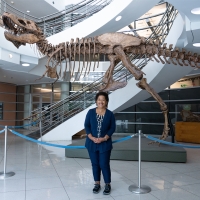"African Students in STEM" by Dr. Kevin Njabo

African Students in STEM – Exploring Wakanda- a Lecture and Discussion led by Dr. Kevin Njabo
When: April 19th from 5:00 pm to 7:00 pm I Where: Hensil Hall 501
Abstract:
Education in STEM is in line with the UN Sustainable Development Goal (SDG4) for ensuring inclusive and quality education for all and promote lifelong learning. How is this statement reflected in sub-Saharan Africa today? What really is the strategic plan on STEM policies, or a road map or even a framework for implementing STEM policies effectively in Africa? The UN currently reports that enrolment in primary education in developing countries has reached 91%, but there are still 57 million children out of school and more than half of the children not enrolled are living in sub-Saharan Africa. In addition, 50% of the out-of-school children of primary school age live in conflict-affected areas. Unemployment remains high in sub-Saharan Africa and one of the main reasons is the phenomenon of structural unemployment, a mismatch between the skills that workers can offer and the skills requested by employers. With lack of effective training, most STEM in Africa jobs are performed by or outsourced to multinationals from China, India, Europe and the U.S. Africa needs cartographers for drawing maps, well-trained engineers to operate machines and build railroads and motorways. Africa needs to invest in R&D to prevent diseases such as AIDS and Ebola; tech entrepreneurs and innovators to resolve local problems with local solutions — all these jobs require a minimum of skills in STEM. Who is thinking of this now in Africa? Who is taking this seriously? Who is acting on this? As Ban Ki-moon indicated in 2016, “Empowering young people through skills development strengthens their capacity to help address the many challenges facing society, including poverty, injustice and violent conflict.” Are we really exploring Wakanda?
Bio:
Kevin Njabo is the Associate Director and Africa Director for the UCLA Center for Tropical Research at the Institute of the Environment and Sustainability (IoES) and an Adjunct Assistant Professor at the IoES and the UCLA Department of Environmental Health Sciences. Kevin is also a founding member of the non-profit organization, the Center for Tropical Research, Cameroon, and is involved in the oversight and management of the International Research and Training Center (IRTC) in Cameroon. Kevin provides content direction and leadership to CTR’s core research priorities, fundraising for research projects, direct and strategic links to regional and international partners and collaborators, and provides assurance for all research work and reports carried out in Africa, including proposals, ethical reviews, and research donor reports. Kevin also serves on several professional bodies including the Board of Directors of the Society for Conservation Biology and as a Council Member of the Pan African Ornithological Congress Committee (PAOCC), 2008-2016. Kevin received his Bachelor’s Degree from the University of Ife, Ile-Ife and Master of Science in Plant Ecology from the University of Ibadan, Nigeria; a PhD in Biology from Boston University, and was a postdoctoral scholar at UCLA. Kevin’s current research interests are in ecology and evolution of emerging tropical diseases.
Dr. Njabo explains his research interests:
My main objective as a conservation biologist is to work for more sustainable and equitable global development. While environmental change and extinction of species are natural processes, human activities are also threatening all things wild, both plants and animals. We are the only species capable of consciously modifying our behavior and environment. As caretakers of the planet, it is our responsibility to respect and manage the Earth’s natural resources, including human population itself. My research investigates the influence of mosquito vectors on the evolution and ecology of avian malaria parasites and attempts to show that human-induced habitat alteration could impact on feeding preferences of these vector mosquitoes. This research is both extremely important and timely, not only in terms of these vector species, but also in the wider context for the number one killer disease of the African continent. This research is expected to highlight the critical role of biodiversity and host community ecology in the transmission of vector-borne zoonotic diseases that in turn has important consequences for human health.



